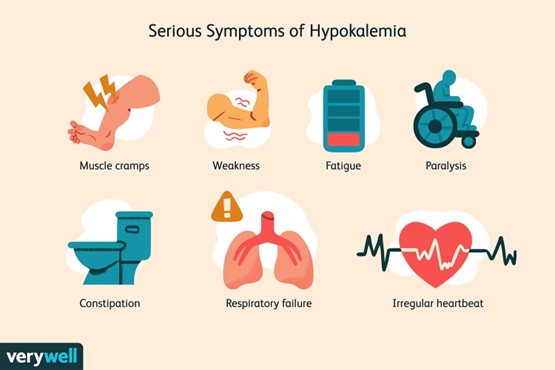A nurse is reviewing the medical record of a client who has sustained a full-thickness burn and is in the emergent phase of the burn. Which of the following findings should the nurse expect?
Hypernatremia
Hypercalcemia
Hypermagnesemia
Hyperkalemia
The Correct Answer is D
The nurse should expect to find hyperkalemia in the medical record of a client who has sustained a full- thickness burn and is in the emergent phase of the burn. This is due to the release of potassium from damaged cells into the bloodstream.
a) Hypernatremia is not a common finding in the emergent phase of a burn.
b) Hypercalcemia is not a common finding in the emergent phase of a burn.
c) Hypermagnesemia is not a common finding in the emergent phase of a burn.
Nursing Test Bank
Naxlex Comprehensive Predictor Exams
Related Questions
Correct Answer is C
Explanation
A nurse collecting data from a client who reports having diarrhea for the past 3 days should identify that muscle weakness is a symptom of hypokalemia. Hypokalemia is a condition in which the blood potassium level is low and can be caused by excessive fluid loss through diarrhea. Potassium helps regulate muscle contractions, so when blood potassium levels are low, muscles may produce weaker contractions which result in muscle weakness.
The other options are not typical symptoms of hypokalemia.
a) Pitting edema is not a typical symptom of hypokalemia.
b) Diplopia is not a typical symptom of hypokalemia.
d) Hyperactive bowel sounds are not a typical symptom of hypokalemia.

Correct Answer is A
Explanation
The action by the AP that indicates an understanding of the procedure is elevating the client's legs before applying the stockings. Elevating the legs can help reduce swelling and make it easier to apply the stockings.
Option b is incorrect because instructing the client to dorsiflex their feet while applying the stockings may not be necessary.
Option c is incorrect because massaging the client's legs before applying the stockings may not be necessary or appropriate.
Option d is incorrect because folding the top of the stockings over after applying them may not be necessary or appropriate.
Whether you are a student looking to ace your exams or a practicing nurse seeking to enhance your expertise , our nursing education contents will empower you with the confidence and competence to make a difference in the lives of patients and become a respected leader in the healthcare field.
Visit Naxlex, invest in your future and unlock endless possibilities with our unparalleled nursing education contents today
Report Wrong Answer on the Current Question
Do you disagree with the answer? If yes, what is your expected answer? Explain.
Kindly be descriptive with the issue you are facing.
